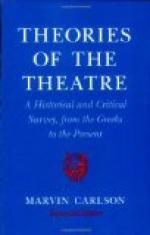No other artist is so little appreciated by the public that enjoys his work, or is granted so little studious consideration from the critically minded, as the dramatist. Other artists, like the novelist, the painter, the sculptor, or the actor, appeal directly to the public and the critics; nothing stands between their finished work and the minds that contemplate it. A person reading a novel by Mr. Howells, or looking at a statue by Saint-Gaudens or a picture by Mr. Sargent, may see exactly what the artist has done and what he has not, and may appreciate his work accordingly. But when the dramatist has completed his play, he does not deliver it directly to the public; he delivers it only indirectly, through the medial interpretation of many other artists,—the actor, the stage-director, the scene-painter, and still others of whom the public seldom hears. If any of these other and medial artists fails to convey the message that the dramatist intended, the dramatist will fail of his intention, though the fault is not his own. None of the general public, and few of the critics, will discern what the dramatist had in mind, so completely may his creative thought be clouded by inadequate interpretation.
The dramatist is obviously at the mercy of his actors. His most delicate love scene may be spoiled irrevocably by an actor incapable of profound emotion daintily expressed; his most imaginative creation of a hard and cruel character may be rendered unappreciable by an actor of too persuasive charm. And, on the other hand, the puppets of a dramatist with very little gift for characterisation may sometimes be lifted into life by gifted actors and produce upon the public a greater impression than the characters of a better dramatist less skilfully portrayed. It is, therefore, very difficult to determine whether the dramatist has imagined more or less than the particular semblance of humanity exhibited by the actor on the stage. Othello, as portrayed by Signor Novelli, is a man devoid of dignity and majesty, a creature intensely animal and nervously impulsive; and if we had never read the play, or seen other performances of it, we should probably deny to Shakespeare the credit due for one of his most grand conceptions. On the other hand, when we witness Mr. Warfield’s beautiful and truthful performance of The Music Master, we are tempted not to notice that the play itself is faulty in structure, untrue in character, and obnoxiously sentimental in tone. Because Mr. Warfield, by the sheer power of his histrionic genius, has lifted sentimentality into sentiment and conventional theatricism into living truth, we are tempted to give to Mr. Charles Klein the credit for having written a very good play instead of a very bad one.




